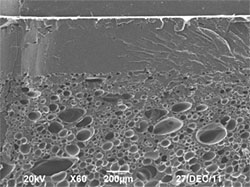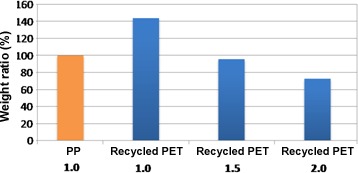March 28, 2012
Furukawa Electric Co., Ltd. has developed foam-molded products using recycled PET flakes (Note 1) for raw material, aiming to reduce the burden on the environment and develop lightweight materials. By using this foam molding technology, it is possible to create products that are lighter and more rigid than existing PP resin molded products. We plan to develop these products as a replacement for the PP resin molded products currently widely used for plastic containers, consumer electronics and other items.
Development Context
The annual sales volume for PET bottles is 595,000 tons and the recovered volume is 429,000 tons (2010). However, applications for use are still limited even though the reclaimed material is recycled as fiber. Now, Furukawa Electric has developed foam molds foamed to a factor of 2, using PET flakes from crushed and recycled PET bottles as the raw material.
Product Features
The foam molds that use recycled PET flakes deliver both lightweight and high rigidity, and can be used to produce precision molds corresponding to three-dimensional shapes. Since we do not use chemical foaming agents for the foaming, the environmental features are also outstanding with no hazardous gases or chemical foaming residues. It is also possible to adjust rigidity according to the purpose by changing the foaming ratio or adding the reinforcing agent.

Photo of a cross-section of the foam molded recycled PET

Foaming factors and weight ratio
(Horizontal axis: resin type (top), foaming factor (bottom)
For example, it is possible to reduce weight by about 30% by replacing conventional molded products made from PP resin with products foamed to a factor of 2 made from recycled PET. In this case, rigidity can be maintained at about 80% of PP resin. In addition to recycled PET, the technology can also be adapted to PPS (polyphenylene sulfide) resin and other super-engineering plastics (Note 2), or PBT (polybutylene terephthalate) resin and other universal engineering plastics(Note 2).
From now on, we will utilize this technology to tackle development of eco-friendly products.
(Note 1)PET flakes:
A type of resin, PET stands for polyethylene terephthalate. PET flakes are formed when PET bottles are crushed into fragments and turned to flakes.
Back to Main Content
(Note 2) Super-engineering plastic and engineering plastic:
Classified by degree of thermal resistance, super-engineering plastic withstands 150°C and above, while engineering plastic withstand 100°C and above. Back to Main Content